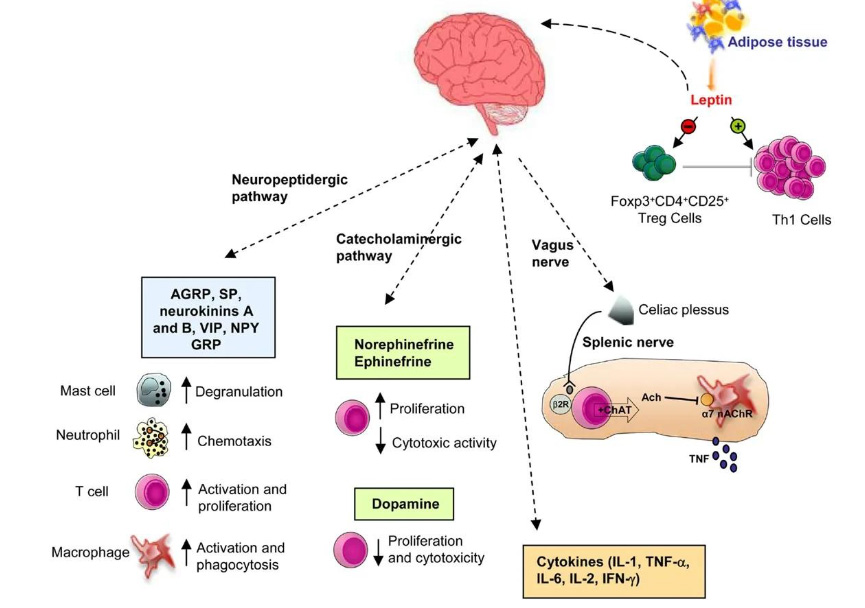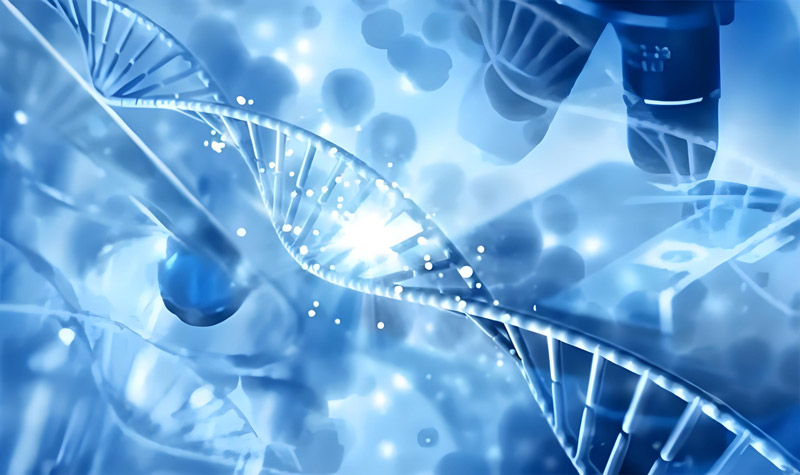The multi-faceted roles of NMN (Nicotinamide mononucleotide) in regulating the immune system.
influence of NMN on immune cells
1. Enhance T cell function
NMN significantly promotes the activation and proliferation of T cells by increasing the level of NAD+ within cells.
NAD+ not only participates in the activation of the T-cell receptor (TCR) signaling pathway, but also provides the necessary energy and material basis for the metabolic reprogramming of T cells.
This enables T cells to more effectively recognize and kill infected cells when responding to immune challenges such as viral infections, while exerting a powerful immunomodulatory effect.
2. Regulate B cell activity
NMN helps maintain the normal physiological functions of B cells, promoting their differentiation and antibody secretion.
Under the stimulation of antigens, B cells require sufficient energy and metabolic support to proliferate and differentiate into plasma cells, and then secrete antibodies.
The NAD+ provided by NMN plays a crucial role in the metabolic process of B cells, ensuring that B cells can effectively produce antibodies and thereby enhancing the humoral immune response of the body.
3. Activate macrophages
Macrophages, as important phagocytes in the immune system, their phagocytic ability and bactericidal activity are crucial for eliminating pathogens.
NMN significantly enhances the ability of macrophages to clear pathogens by increasing NAD+ levels, activating relevant signaling pathways within macrophages, and promoting the production of bactericidal substances such as nitric oxide by macrophages.
NMN can also promote the secretion of inflammatory factors by macrophages, effectively initiating and regulating immune inflammatory responses.
4. Promote NK cell activity
Natural killer cells (NK cells) are an important component of the body's innate immunity.
NMN can enhance the activity of NK cells and their killing ability against tumor cells and virus-infected cells.
NAD+ plays a significant role in the signal transduction and metabolic processes within NK cells, maintaining their normal functions and activities, and enabling them to more effectively identify and eliminate abnormal cells.
Regulation of immune-related signaling pathways
1. Activate SIRT1 pathway
After NMN is converted into NAD+, it can activate the SIRT1 protein in the Sirtuins family.
SIRT1 regulates the activities of numerous key transcription factors and signaling proteins within immune cells, such as nuclear factor -κB (NF-κB) and forkhead box protein O (FOXO), through deacetylation.
This helps to influence the proliferation and differentiation of immune cells and the expression of immune factors, thereby maintaining the homeostasis of the immune system.
For instance, SIRT1 can inhibit the activity of NF-κB, reduce the excessive secretion of inflammatory factors, and prevent immune inflammatory responses from getting out of control.
2. Regulate NLRP3 inflammasome
After recognizing pathogen-associated molecular patterns (PAMPs) and damage-associated molecular patterns (DAMPs), the NLRP3 inflammasome can activate caspase -1 and promote the maturation and secretion of inflammatory factors such as interleukin-1 β (IL-1β).
NMN may maintain the balance of immune inflammatory responses by regulating NAD+ levels and influencing the assembly and activation of NLRP3 inflammasomes, thereby preventing excessive inflammatory responses from causing damage to the body.
impact on immune-related metabolism
1. Regulate energy metabolism
Immune cells require a large amount of energy in the process of activating and performing immune functions.
The NAD+ provided by NMN participates in intracellular REDOX reactions and energy metabolism processes, such as the tricarboxylic acid cycle (TCA cycle) and oxidative phosphorylation, providing sufficient energy support for the proliferation, differentiation and immune activity of immune cells.
For instance, after T cells are activated, their metabolic mode shifts from oxidative phosphorylation to aerobic glycolysis. NMN helps maintain the normal progress of this metabolic conversion process, ensuring that T cells can continuously exert their immune function.
2. Maintain REDOX equilibrium
When immune cells are functioning, they produce reactive oxygen species (ROS). An appropriate amount of ROS helps immune cells kill bacteria and activate immune signaling pathways.
Excessive ROS can cause oxidative damage to cells and affect the function of immune cells.
NMN enhances the antioxidant defense system within cells by increasing the level of NAD+, such as regulating the levels of antioxidant substances like glutathione (GSH), thereby maintaining the REDOX balance within immune cells, protecting them from oxidative damage, and preserving their normal immune function.
Improvement of immune function decline related to aging
1. Restore the vitality of immune cells
As people age, the function of immune cells gradually declines.
NMN significantly improves the mitochondrial function of immune cells by increasing NAD+ levels and activating anti-aging proteins such as SIRT1, reduces inflammatory signals and oxidative stress within cells, and thereby restores the vitality and function of immune cells.
In elderly individuals, supplementing NMN can restore to a certain extent the proliferation ability of T cells and B cells and the immune response ability.
2. Regulate the signaling pathways related to immune senescence
During the aging process, some signaling pathways within immune cells become abnormal, leading to immune dysfunction.
NMN can regulate these aging-related signaling pathways, such as inhibiting the excessive activation of the mTOR signaling pathway, reducing the aging and apoptosis of immune cells, and maintaining the homeostasis of the immune system.
NMN can also regulate the inflammatory microenvironment related to aging, reduce the damage of chronic inflammation to the immune system, enhance the immune function of the body, and thereby delay the process of immune aging.






